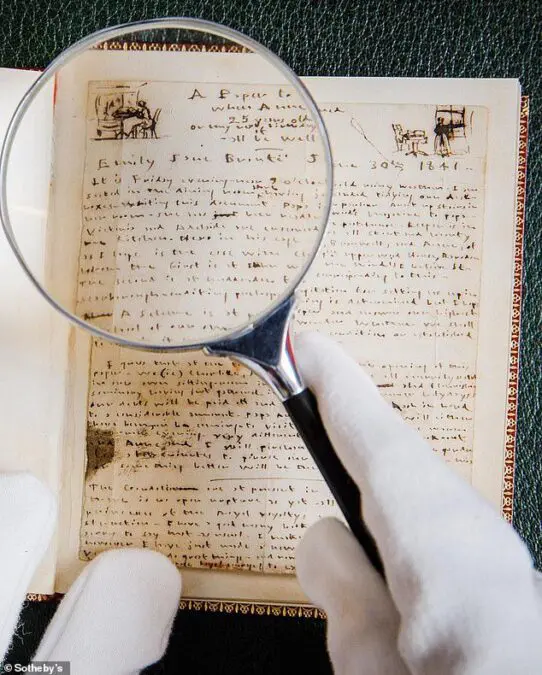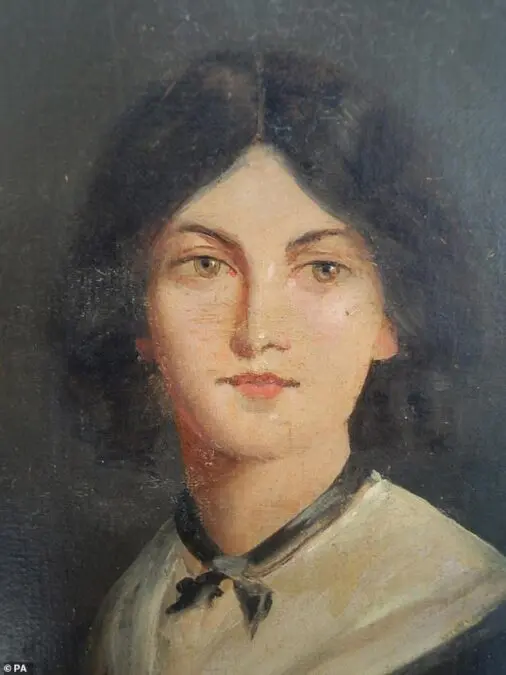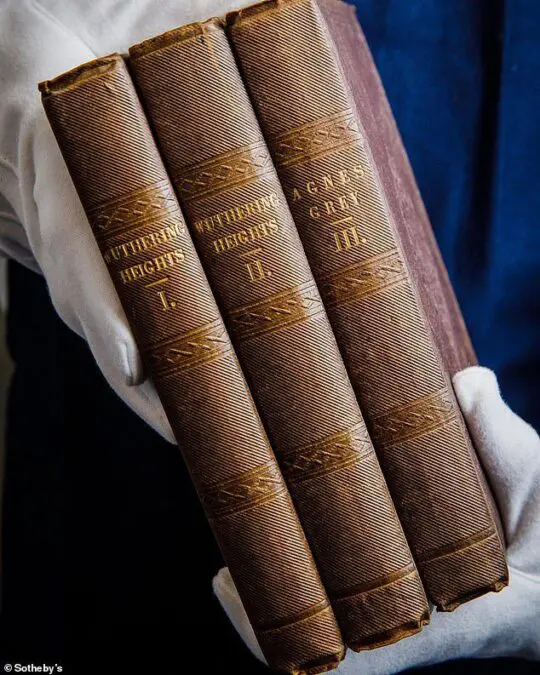The name T. J. Wise will mean little to those outside the lofty world of rare books: it appears in passing in the details of an ‘incredibly rare’ set of handwritten poems by Emily Bronte which was to have been auctioned at Sotheby’s next month.
The poems — along with further Bronte notes, sketches, letters and books — are part of the Honresfield library, a collection of literary treasures amassed by Victorian industrialists, which also includes letters from Jane Austen to her sister Cassandra.
So important is the haul that the sale has been temporarily put on hold to allow a consortium led by Friends of the National Libraries, including Oxford’s Bodleian, the British Library and the National Library of Scotland, to try to raise £15 million to save the manuscripts for the nation.
Thomas J. Wise, born in 1859, had an international reputation as a bibliographic scholar and collector of rare books – perhaps the pre-eminent authority on book collecting and valuing modern first editions
So the future of the trove remains uncertain: not so the reputation of the man who plays his own part in this literary drama. Wise owned a number of Bronte manuscripts — works by Charlotte, Emily, Branwell and Anne — but his skill as a collector and dealer has long been lost to his notoriety.
His name now serves as a reminder of one of the greatest literary scandals of the 20th century.
Wise was at the centre of a bibliographic whodunnit of the highest order, a tale of class, money and hubris in which the ingenuity of a couple of young scholars destroyed the reputation of one of the most respected men of their age.
The early 20th century was a golden era of book collecting, when some of the foundations of the British Museum’s unparalleled collection of rare books were laid.
Book collecting had been a game for the wealthiest aristocrats, seeking out priceless copies of works by Shakespeare or Chaucer.
Towards the end of the 19th century, attention shifted to rare editions of what would now be called ‘modern classics’ — works by the Romantic poets and 19th-century novelists.
Thomas J. Wise, born in Gravesend, Kent, in 1859, was at the epicentre of this new and growing world.
For most of his career, Wise had an international reputation as a bibliographic scholar and collector of rare books — perhaps the pre-eminent authority on book collecting and valuing modern first editions. He became president of The Bibliographical Society and a trustee of the British Museum. He sat on the consultative committee of the Bodleian Library and became an Honorary Fellow of an Oxford college.

However, a rogue comma revealed him as a forger, a thief and a cheat. Throughout his career, Wise had been ‘discovering’ and selling valuable ‘first editions’ that had never actually existed
He was also regarded as an expert on authenticating rare books and detecting fraud.
But just three years before the end of his long life — when he could reasonably have expected to be borne into posterity amid universal acclaim — Wise’s world imploded. He was revealed as a forger, a thief and a cheat. This head gamekeeper was, it turned out, the worst poacher of all.
Throughout his career, Wise had been ‘discovering’ and selling valuable ‘first editions’ that had never actually existed.
He had staged phoney auctions to establish high prices for his own forgeries. He ripped out and stole pages from valuable books in the British Museum’s permanent collection to cannibalise them into the equivalent of what used-car dealers call ‘cut-n-shut’ jobs, before selling them to wealthy patrons in America.
It should be added here that there are no questions over the authenticity of the Bronte trove.
Why did he do it when his legitimate talents had already brought him a long way? Though Wise liked to hint that he was descended from Irish aristocracy, he was born into poverty.
He shared a poky home with his widowed father and two brothers and, as far as is known, never attended school, let alone university. Yet his late mother had left him with a love of the Romantic poets — Shelley in particular.
As a boy, he walked instead of taking a bus so he could save pennies to buy books. He hustled his way into the book world via the Shelley Society and made his name arranging for (legitimate) facsimile first editions to be printed.
He went on to seek out and supply rare books to America’s so-called robber barons — ruthless and highly successful industrialists who wanted to acquire their own libraries.

The name T. J. Wise appears in passing in the details of an ‘incredibly rare’ set of handwritten poems by Emily Bronte (pictured) which was to have been auctioned at Sotheby’s next month
He was damned good at it. As Joseph Hone, an academic writing a biography of Wise, describes it, ‘he was a serious, and a seriously good, collector’. And yet that wasn’t enough. He cheated, too. His confirmed forgeries include editions of everyone from Dickens and Tennyson to George Eliot and Wordsworth.
Nemeses arrived in the form of two young book dealers. While Wise had elbowed his way into the establishment by force of personality and low cunning, these two were definitely to the manor born.
John Carter had breezed from Eton scholarship to a double first at King’s College, Cambridge. Even in his 20s he wore a monocle, and is reputed to have supplied James Bond’s creator Ian Fleming with the recipe for the perfect dry martini.
Graham Pollard was more roguish: Oxford-educated, he barely scraped a third and didn’t even bother to collect his degree. A member of the aristocratic student drinking club the Hypocrites, he boasted of having beaten Evelyn Waugh to a half-blue in competitive spitting.
Carter and Pollard became friends through a group of young booksellers known as the Biblio-boys, who met often to gossip over sherry.
Their interest was piqued when rumours began to circulate that there might be something not quite kosher about a much sought-after 1847 edition of Sonnets From The Portuguese, written by Elizabeth Barrett Browning.
The forgery had followed Wise’s by now standard modus operandi: print a copy of a genuine text and change the publication date, to imply it was a limited edition that had been circulated privately before the main printing. In an instant, you have a valuable property — and one that is very hard to prove is fake. Any comparators would be assumed to be squirrelled away in some other private collections.

The sale has been temporarily put on hold to allow Friends of the National Libraries, including Oxford’s Bodleian, the British Library and the National Library of Scotland, to try to raise £15 million to save the manuscripts (pictured) for the nation
Yet Carter, who had been asked to secure one by a client, smelled a rat. He ended up comparing notes with Pollard, who was onto an equally fishy edition of Ruskin. The two got together and started an investigation that was as pitiless as it was ingenious.
Forensic work on the history of type established, for example, that there was a special aspect of the lower case ‘f’ that could only be found after 1880.
Their analysis of a forged edition of George Eliot’s poem Agatha turned on such minutiae as the hyphenation in ‘garden-gate’, a comma after the word ‘behind’, and the stray letter ‘s’ turning ‘thing’ into ‘things’.
They were the first to do serious chemical analysis of paper, anticipating work done on other notorious frauds such as the Hitler Diaries in the 1980s.
Discovering that certain types of wood pulp were used only after the 1880s or 1890s, they persuaded a librarian at Harvard to let them analyse a sliver of the Browning edition in their collection — and lo and behold, the paper turned out to come from much later than the date on the title page.
When they tumbled to what Wise had been up to, it was, as Carter put it: ‘…as if the Bank of England had been caught issuing counterfeit money’.
He and Pollard steadily built their case, and in 1934 they dropped their neutron bomb on the book world. An essay entitled An Enquiry Into The Nature Of Certain Nineteenth Century Pamphlets might sound somewhat dull, but its impact was devastating — a forensic work of genius that systematically debunked dozens of valuable 19th-century editions as outright fakes.
And what did those editions have in common? They had all been authenticated by Thomas J. Wise.
The authors delicately avoided ever accusing their man of fraud. They did not need to. Bibliophiles are good at reading between the lines. Wise died in disgrace.
Here was a man who wrote the standard bibliographies for swathes of 19th-century writers — and inserted references to his own forgeries.
He introduced them into the permanent collections of the British Museum and craftily seeded a mention of that 1847 edition of Sonnets From The Portuguese into an account of the Brownings’ honeymoon.
Around 100 of his forgeries have been found, though Hone suspects there are more. ‘We’re still reckoning with Wise’s legacy,’ he says.
And in a twisted way, Wise — this Robert Maxwell of the antiquarian book world — might be amused.






